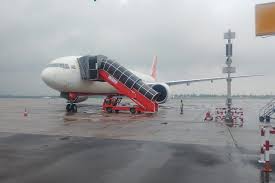787-operated 13 flights cancelled: No safety concern in A-I 787s, DGCA flags maintenance issues

In a notable disruption for passengers and aviation observers alike, Air India has cancelled 13 flights operated by Boeing 787 Dreamliners after the Directorate General of Civil Aviation (DGCA) flagged multiple lapses in maintenance procedures. However, India’s civil aviation regulator was quick to reassure the public that there is no immediate safety risk linked to the aircraft fleet.
The cancellations, which took place over the past few days, were not due to mechanical failures but were instead the result of precautionary actions following an internal review of Air India’s maintenance protocols. The DGCA, while conducting routine surveillance of airline operations, observed inconsistencies that prompted further scrutiny.
DGCA’s Observation: No Safety Hazard, But Maintenance Gaps Noted
Officials from the DGCA stated that the Boeing 787 Dreamliner fleet remains airworthy, and there is no need for public concern about safety during flight. However, the regulator found deficiencies in documentation and adherence to prescribed maintenance schedules, especially for components that require periodic inspection and replacement.
A senior official said, “The 787 is a modern and reliable aircraft. What we have noticed are procedural lapses—not safety violations. These include delays in certain scheduled maintenance checks and minor gaps in technical documentation.”
According to sources, the issues flagged were related to Component Life Limited Parts (LLP) tracking, logbook accuracy, and compliance with certain Airworthiness Directives (ADs). While none of these issues posed a direct risk to operations, the regulator emphasized the need for strict compliance to global aviation norms, particularly given the scale of Air India’s ongoing expansion.
Air India Responds: Flights Cancelled as a Precaution
In response to the DGCA’s findings, Air India voluntarily grounded 13 Dreamliner-operated flights, stating that it did so out of an “abundance of caution.” The airline also launched a thorough review of its engineering processes.
In a statement issued late Tuesday, Air India noted:
“We acknowledge the observations made by the DGCA and are fully cooperating with the regulatory authority. As a responsible operator, we have decided to proactively cancel certain flights to facilitate technical rechecks and ensure full compliance.”
The airline also stressed that none of the cancelled flights had experienced any technical issue during operation, and that the decision was purely preventive, not reactive.
Passengers Affected, But Offered Alternatives
The abrupt cancellations caused inconvenience to several domestic and international travelers, especially those flying between metro cities like Delhi, Mumbai, Bengaluru, and overseas routes to London and Singapore. However, Air India assured affected passengers that they were either rebooked on alternative flights or offered full refunds.
“Our customer service teams are reaching out to every impacted passenger to offer solutions. We regret the inconvenience caused, but safety and compliance remain our top priorities,” the statement added.
Travelers who spoke to reporters at Delhi and Mumbai airports expressed mixed reactions. While some praised the airline for prioritizing safety, others voiced frustration over the short notice and lack of timely communication.
A Wake-Up Call for Expanding Fleet Operations?
Air India, now owned by the Tata Group, has been on an aggressive growth path, placing the world’s largest aircraft order of 470 jets in 2023, including more Boeing 787s. With this surge in capacity and new route planning, maintenance and engineering oversight becomes increasingly critical.
Aviation analysts say the recent development could be a signal to ensure that infrastructure and manpower keep pace with growth. “Air India’s ambition is commendable, but with rapid fleet expansion comes the need for robust backend support—especially in engineering and compliance. The DGCA’s move is timely and necessary,” said aviation consultant Anuj Trivedi.
DGCA Strengthens Surveillance Post Go First Crisis
The Indian aviation regulator has taken a more proactive stance following recent airline issues, such as Go First’s grounding over engine issues and SpiceJet’s operational scrutiny. In recent months, the DGCA has ramped up spot audits, ramp inspections, and surveillance of fleet maintenance.
This current incident is part of that effort. The regulator insists that its aim is not to penalize airlines but to maintain trust in Indian aviation’s global standing. India is now one of the fastest-growing aviation markets, and its oversight systems are under close watch by global authorities.
Conclusion: A Reminder, Not a Red Flag
While 13 flight cancellations and DGCA interventions may raise public eyebrows, aviation experts and insiders agree that the matter is a warning, not a crisis. The Dreamliner fleet remains fundamentally safe, and both Air India and the DGCA have acted within prudent boundaries.
What emerges from the episode is a larger takeaway: as Indian carriers scale operations and modernize fleets, operational discipline, regulatory oversight, and engineering standards must also evolve in tandem.






